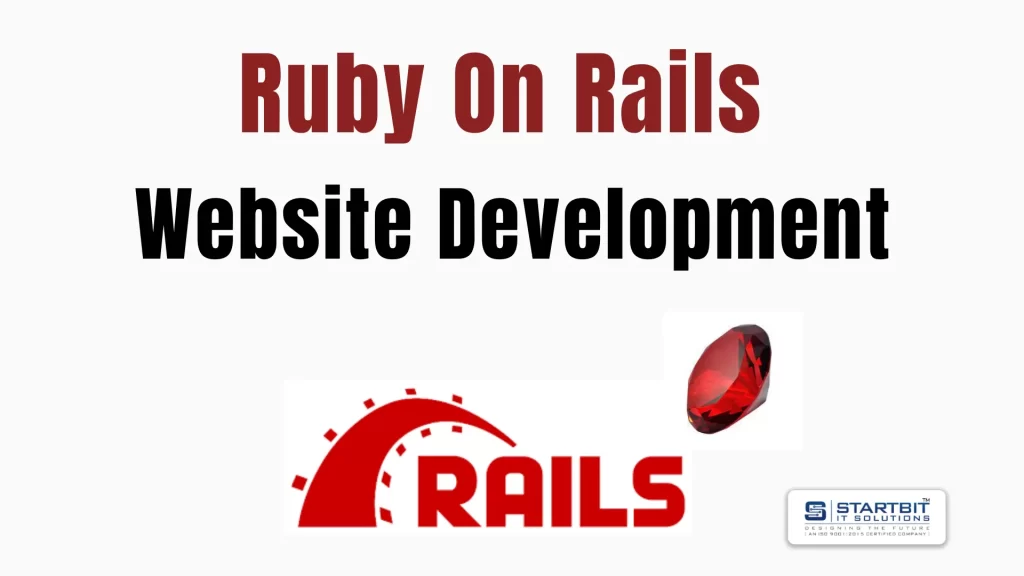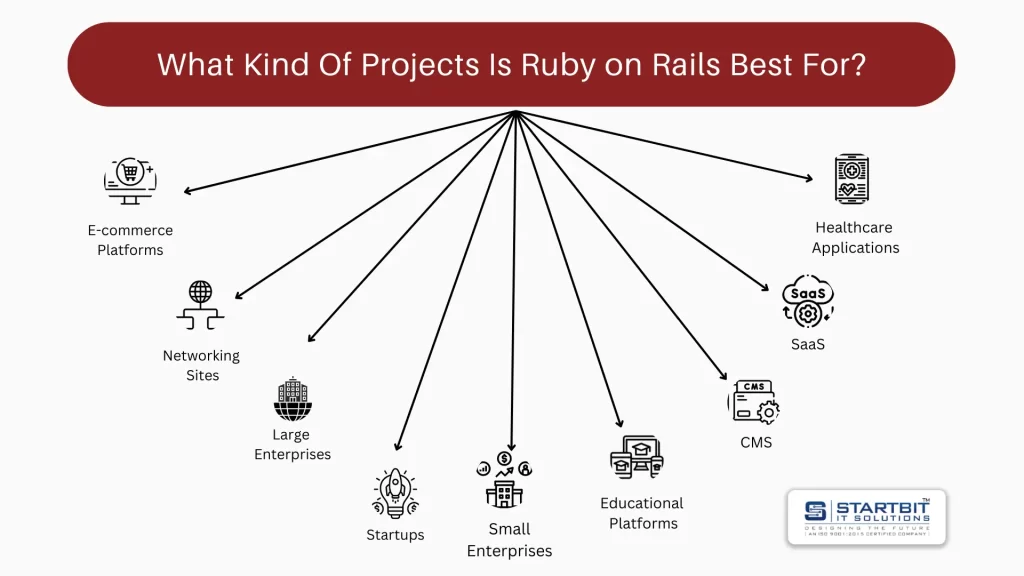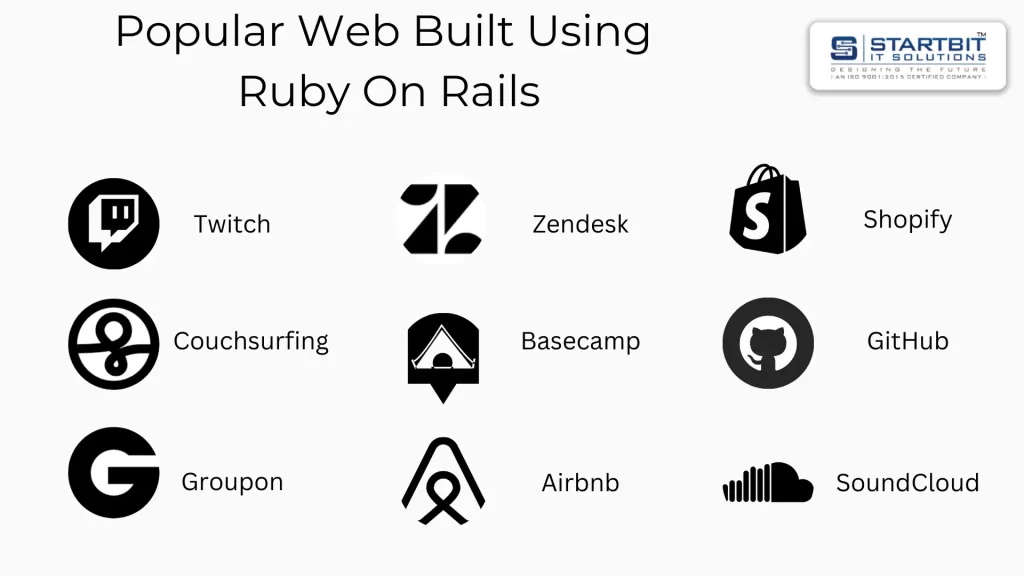What is Ruby on Rails (RoR)?
Ruby on Rails, commonly known as Rails or RoR, is a powerful software library that extends the capabilities of the Ruby programming language. Created by David Heinemeier Hansson, Rails is an innovative web development framework designed to simplify the process of creating dynamic web applications. As an open-source tool, Rails provides developers with a robust, flexible platform for efficiently developing web applications.
Rails stands out for its ability to simplify and speed up the development of web applications, as it provides easy-to-use solutions for common tasks such as creating tables, menus, and forms. By leveraging the power of Ruby, Rails enables developers to write clean, readable code while maintaining productivity.
A key feature of Rails is the use of the model-view-controller (MVC) architecture. This design pattern separates the application logic, user interface, and data storage into distinct components, making the development process more organized and scalable. The MVC architecture also facilitates code reuse, enhances maintainability, and reduces redundancy.

Rails seamlessly integrates JavaScript, CSS, and HTML with Ruby, allowing developers to create fully functional web applications that run on a web server. This integration ensures that developers can focus on writing the core logic of their applications while Rails handles the intricacies of web development.
As a backend web development framework, Rails operates on the server side, managing data, business logic, and server responses. This makes Rails particularly well-suited for developing complex web applications that require robust backend support.
How Does Ruby on Rails Help in Web Development?
Convention over Configuration (CoC):
Rails promotes “Convention over Configuration,” which means it assumes sensible defaults, reducing the number of decisions developers have to make. This leads to faster development as many decisions are already made by the framework.
Model-View-Controller (MVC) Architecture:
Rails uses the MVC pattern, which helps in organizing application programming. It separates concerns, making it easier to manage code, improve maintainability, and promote modular development.
Active Record:
Active Record is the Object-Relational Mapping (ORM) layer supplied with Rails. It simplifies database interactions by allowing developers to query and manipulate data using Ruby objects rather than writing raw SQL queries.
Built-in Testing Framework:
Rails comes with a built-in testing framework, making it easy to write and run tests. This encourages a test-driven development (TDD) approach, which leads to more robust and error-free code.
Rich Ecosystem and Gems:
Rails has a rich ecosystem with a vast library of “gems” (plugins/extensions) that can be easily integrated into applications. This allows developers to add functionality without building from scratch.
Scaffolding:
Rails provides scaffolding, which automatically generates some of the boilerplate code needed for a new application, such as models, views, and controllers. This speeds up the initial development process.
RESTful Routes:
Rails supports RESTful design, making it straightforward to create APIs that follow REST principles. This is particularly beneficial for building web services and ensuring that the application can easily interact with other systems.
Community and Support:
Rails has a large and active community. This means ample documentation, tutorials, and forums where developers can seek help and share knowledge. Additionally, many third-party services and tools are designed to work well with Rails.
Security:
Rails includes several security features by default, such as protection against SQL injection, cross-site scripting (XSS), and cross-site request forgery (CSRF). This helps developers build secure applications more easily.
Why Choose Ruby on Rails?
Rapid Development:
Rails is designed to make development quick and efficient. Its conventions and ready-to-use components mean developers can build applications faster than with many other frameworks.
Cost-Effective:
Faster development translates to lower development costs. Additionally, the extensive use of open-source gems reduces the need for custom development, further saving time and money.
Scalability:
While Rails is often associated with startups and small to medium-sized applications, it can scale effectively. Many large-scale applications (e.g., GitHub, Shopify) have been built using Rails.
Consistency and Maintainability:
The conventions used in Rails lead to consistent codebases, which are easier to maintain and extend. This is particularly valuable in a team setting or for projects that will be developed over many years.
Agility and Flexibility:
Rails’ flexibility allows developers to adapt and iterate quickly, which is crucial in agile development environments. This makes it easier to respond to changing requirements and improve the application iteratively.
Quality and Reliability:
The emphasis on testing and the mature ecosystem of tools and libraries contribute to building high-quality, reliable applications.
Integration:
Rails integrates well with other technologies and services, making it a versatile choice for web development. Whether it’s integrating with frontend frameworks like React or Vue.js, or using background job processors like Sidekiq, Rails makes it seamless.
Job Market and Community Support:
There is a strong demand for Rails developers, and many resources are available for learning and improving Ruby on Rails skills. The supportive community enhances learning and problem-solving.

What kind of projects is Ruby on Rails best for?
Ruby on Rails (RoR) is a powerful web development framework that is well-suited for a variety of projects due to its simplicity, scalability, and rapid development capabilities. Here are some specific types of projects , along with the benefits and features for each:
Social Media Platform:
RoR’s rapid development cycle and ability to handle complex user interactions make it ideal for creating social media platforms. Its robust database support and active community can help manage large-scale user bases and social functionalities.
Benefits and Features:
- Rapid Development: RoR’s conventions and modular structure allow for quick iteration and development.
- Scalability: RoR supports scalable architectures to handle large numbers of users and interactions.
- Real-Time Updates: Integrates easily with WebSocket for real-time updates, notifications, and messaging.
- User Authentication: Built-in tools for secure user authentication and authorization.
- Third-Party Integrations: Easy to integrate with external APIs for extended functionalities (e.g., social media sharing, login).
E-commerce Website:
With gems like Spree and Solidus, RoR excels at building scalable and customizable e-commerce solutions. Features such as payment processing, inventory management, and user authentication can be efficiently implemented.
Benefits and Features:
- Robust Libraries: Plenty of gems available for payment processing, inventory management, and shipping.
- Secure Transactions: Inherent security features to handle sensitive data like payment information.
- User-Friendly: Customizable storefronts and user interfaces.
- SEO Friendly: Built-in features for search engine optimization.
- Scalable Architecture: Supports large product catalogs and high traffic volumes.
Blogging Platform:
RoR’s simplicity and ease of use make it a popular choice for creating blogging platforms. The framework’s built-in support for creating, reading, updating, and deleting (CRUD) operations aligns well with the needs of a blogging site.
Benefits and Features:
- Content Management: Easy-to-use content management system for creating and managing posts.
- SEO Optimization: Tools for optimizing blog content for search engines.
- Customizable Themes: Flexible template system for unique blog designs.
- User Interaction: Features for comments, likes, and social sharing.
- Tagging and Categorization: Organize content with tags and categories for better navigation.
Project Management Tool:
oR’s flexibility allows developers to create feature-rich project management tools that include task tracking, collaboration, scheduling, and reporting functionalities.
Benefits and Features:
- Task Management: Create, assign, and track tasks and projects.
- Collaboration Tools: Features for team communication, file sharing, and real-time updates.
- Time Tracking: Integrated time tracking and reporting tools.
- User Roles: Different access levels and permissions for team members.
- Integration: Connects with other tools like Slack, Trello, and GitHub.
Event Management Platform:
RoR is suitable for developing event management systems that handle event creation, ticket sales, user registration, and event scheduling efficiently.
Benefits and Features:
- Event Creation: Tools for creating and managing events.
- Ticketing System: Integrated ticketing and payment processing.
- Calendar Integration: Sync events with personal and professional calendars.
- Notifications: Email and SMS notifications for event updates.
- Analytics: Track attendee statistics and event performance.
Job Board:
The framework’s ease of integrating third-party services and its scalability make it a great option for building job boards, which require features like job listings, user profiles, and search functionality.
Benefits and Features:
- Job Listings: Easy job posting and management.
- Resume Uploads: Allow job seekers to upload and manage resumes.
- Search and Filters: Advanced search and filtering options for job seekers.
- Application Tracking: Track applications and status updates.
- Employer Profiles: Detailed profiles for employers to attract top talent.
Online Learning Platform:
RoR can be used to develop online learning platforms with features like course management, user progress tracking, and interactive learning tools.
Benefits and Features:
- Course Management: Create and manage courses, lessons, and quizzes.
- User Progress Tracking: Monitor student progress and performance.
- Interactive Content: Support for video, audio, and interactive content.
- Discussion Forums: Facilitate discussions and interactions between students and instructors.
- Certificates: Issue completion certificates.
Restaurant Reservation System:
RoR’s rapid development capabilities make it well-suited for creating restaurant reservation systems that need to manage bookings, customer data, and scheduling.
Benefits and Features:
- Reservation Management: Allow users to book and manage reservations.
- Table Management: Optimize table assignments and availability.
- Notifications: Send confirmation and reminder notifications.
- Customer Profiles: Maintain customer profiles for personalized service.
- Integration: Sync with online maps and review sites.
Fitness Tracker:
While not the most common choice for mobile-centric applications, RoR can still be used for developing web-based fitness trackers with features like workout logging, progress tracking, and user profiles.
Benefits and Features:
- Activity Tracking: Log workouts and daily activities.
- Goal Setting: Set and track fitness goals.
- Progress Reports: Detailed progress reports and analytics.
- Community Features: Social features to connect with other users.
- Integration: Sync with wearable devices and other health apps.
Content Management System (CMS):
RoR is highly effective for building custom CMS solutions that allow for content creation, management, and publication. Its flexibility supports the development of tailored CMS functionalities.
Benefits and Features:
- User-Friendly Interface: Intuitive interface for managing content.
- Template System: Customizable templates for different types of websites.
- Plugin Architecture: Extend functionality with plugins.
- SEO Tools: Built-in SEO tools for optimizing content.
- User Roles: Different access levels for content creators and administrators.
Social Networking Sites:
Similar to social media platforms, RoR’s strong community support and rapid development capabilities make it a good choice for building social networking sites with complex user interactions and real-time features.
Benefits and Features:
- User Profiles: Detailed user profiles and timelines.
- Friends and Connections: Tools for connecting and interacting with friends.
- Messaging: Private and group messaging systems.
- Media Sharing: Share photos, videos, and other media.
- Activity Feeds: Real-time activity feeds and notifications.
Educational Platforms:
RoR can support the development of comprehensive educational platforms with functionalities such as course management, user enrollment, content delivery, and progress tracking.
Benefits and Features:
- Course Management: Tools for creating and managing courses.
- Student Portal: Personalized portals for students to access course materials.
- Assessments: Online quizzes and assessments.
- Collaboration Tools: Forums and chat features for student collaboration.
- Certificates: Generate certificates upon course completion.

Popular Websites developed by Ruby on Rails:
Here are some popular websites and platforms built using Ruby on Rails:
GitHub: A platform for version control and collaboration, GitHub is one of the most famous websites built with Ruby on Rails. It allows developers to host and review code, manage projects, and build software alongside millions of other developers.
Shopify: An e-commerce platform that allows individuals and businesses to create online stores. Shopify powers over a million businesses worldwide and is one of the largest sites using Rails.
Basecamp: A project management tool that helps teams collaborate and organize their work. Basecamp was developed by 37signals, the company that created Rails.
Airbnb: A marketplace for lodging and tourism experiences, Airbnb connects hosts and travelers. It initially used Ruby on Rails to quickly iterate and develop its platform.
Hulu: A streaming service offering live and on-demand TV and movies, Hulu used Ruby on Rails in its early days to build its user interface and manage content.
Twitch: The leading live streaming platform for gamers and other lifestyles, Twitch used Rails to handle its web application requirements during its growth phase.
SoundCloud: An online audio distribution platform and music sharing website that enables users to upload, promote, and share their sounds, SoundCloud utilized Rails for its web application.
Groupon: A deal-of-the-day website that features discounted gift certificates usable at local or national companies, Groupon was initially built with Ruby on Rails.
Zendesk: A customer service and engagement platform that provides a ticketing system, Zendesk uses Rails for its web interface.
Couchsurfing: A service that connects members to a global community of travelers and local hosts, Couchsurfing also employed Ruby on Rails for its web platform.
Startbit IT Solutions Ruby and Rails Development Services:
Startbit IT Solutions is a renowned IT consultancy firm specializing in Ruby on Rails development. With years of experience and a team of skilled developers, Startbit offers a wide range of services, including web application development, API integrations, and maintenance.
Ruby on Rails Development Process at Startbit IT Solutions:
At Startbit, the Ruby on Rails development process follows a systematic approach:
- Requirements Gathering: Understanding client needs and project objectives.
- Design and Planning: Creating wireframes, defining database structures, and outlining project milestones.
- Development and Testing: Writing clean, efficient code and rigorously testing for bugs and errors.
- Deployment and Maintenance: Deploying the application to production servers and providing ongoing support and updates.
Benefits of Choosing Startbit IT Solutions for Ruby on Rails Development:
- Experienced Team of Developers: Startbit boasts a team of seasoned Ruby on Rails developers with a proven track record of delivering high-quality solutions.
- Customized Solutions: Every project at Startbit is approached with a bespoke solution tailored to the client’s specific requirements and business goals.
- Timely Delivery and Ongoing Support: Startbit values client satisfaction and strives to deliver projects on time while providing continuous support and maintenance post-launch.
Conclusion:
Ruby on Rails (RoR) is a powerful web development framework known for its simplicity, rapid development capabilities, and scalability. It is suitable for a wide range of projects, including social media platforms, e-commerce websites, blogging platforms, project management tools, event management systems, job boards, online learning platforms, restaurant reservation systems, fitness trackers, content management systems (CMS), social networking sites, and educational platforms.
Startbit IT Solutions is a reputable IT consultancy firm specializing in Ruby on Rails development, offering services such as web application development, API integrations, and maintenance. With an experienced team of developers and a systematic development process, Startbit provides customized solutions, timely delivery, and ongoing support to ensure client satisfaction.

